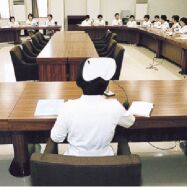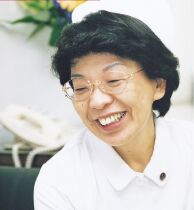A: The biggest reasons were that I believed I could be good at it and that I could be proud of being a nurse. When I graduated from the School of Health Sciences attached to the Faculty of Medicine at Kyushu University in 1967, I began to work at the Kyushu University Hospital and spent almost a quarter of a century in the Department of the Pediatrics. I began teaching at the School of Health Sciences in 1995 and continued until 1999 when I became a Head Nurse.
Q Physically and mentally, is it hard to serve as a nurse?
serve as a nurse? A: Yes. Actually, being a nurse is a responsible position. Therefore, nurses must keep up their motivation. Because they set their strong mind to become a nurse, most of the nurses continue to work throughout the stages of their lives. I think the keywords for nurses are 'knowledge,' 'skill' and 'heart.' Although the three of these are totally necessary for nurse, however, I suppose 'heart' is most essential because patients who are suffering from disease come to the hospital and when we care them, we should have tender thoughtfulness.
Q When do you feel proud of being a nurse? When do you feel delighted as a nurse?
A: It is when patients' conditions improve and they tell me 'thank you.' I also feel delighted when patients become calm, for example, when a baby stops crying and falls asleep. I should continue to study hard so that I can provide such care to the patients.
Q These days, medical accidents often happen and that has become the problem.
A: I believe we should review "near misses" effectively and learn from them. A hospital attached to a university is different from a general hospital in that it functions as a center of research and education in addition to providing medical care. We should try to reduce the number of medical accidents while still fulfilling these three functions, and in that regard I hope I can make good use of my experience at Kyushu University Hospital.
Q Lately, it seems that some nurses do not wear nursesf caps.
A: Since June of last year, nurses at Kyushu University Hospital are not required to wear caps while on duty.
Nurses' caps are said to be the symbol of a nurse, however, sometimes it actually hinders our tasks. At present, most of our nurses do not wear the cap, but I think the most important thing is the care we give, regardless of our appearance.
 Q
Do you have any
advice to students
who desire to become
nurses?
Q
Do you have any
advice to students
who desire to become
nurses?A: Keep your motivation and study hard. In your private life, gain new experiences as often as you can. I also would like to see them gain strength in order to overcome any difficulties in their lives.
Q Could you tell me about your daily routine?
A: I come to the office at 7:40 every morning. Most of my morning is occupied by staff meetings, and in the afternoon I have a number of visitors and perform various unscheduled tasks. After 6:00 in the evening I can do my own duties. I go back home around 9:00 pm. As a nurse, wife and mother, I have experienced both difficulties and joys. My experiences at the Department of the Pediatrics were particularly helpful when I brought up my own children. I could also learn to understand others. Now I am happy to feel that it was good for me to continue working here. Although this interview started at 5:00pm, even an hour later (at 6, which she had told us was time to do her personal tasks), Ms. Okubi had a lot of phone calls and visitors. We could only guess she was this busy everyday.
 The University Hospital attached to Kyushu University's School of
Medicine is one of the largest
national university hospitals
in Japan. Ms. Mutsumi Okubi
serves as a Head Nurse and
oversees 700 nurses.
The University Hospital attached to Kyushu University's School of
Medicine is one of the largest
national university hospitals
in Japan. Ms. Mutsumi Okubi
serves as a Head Nurse and
oversees 700 nurses.